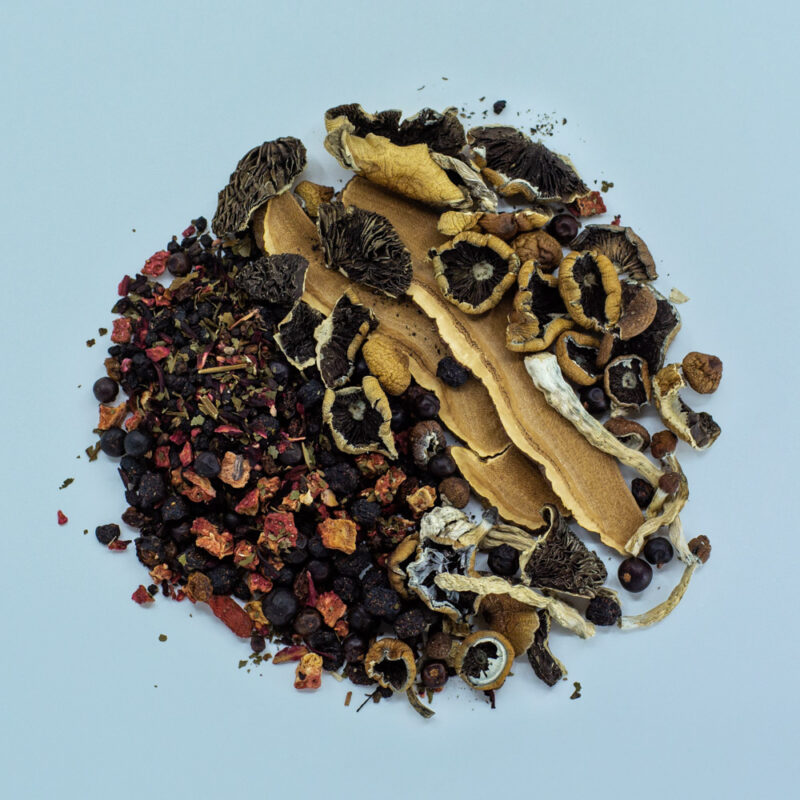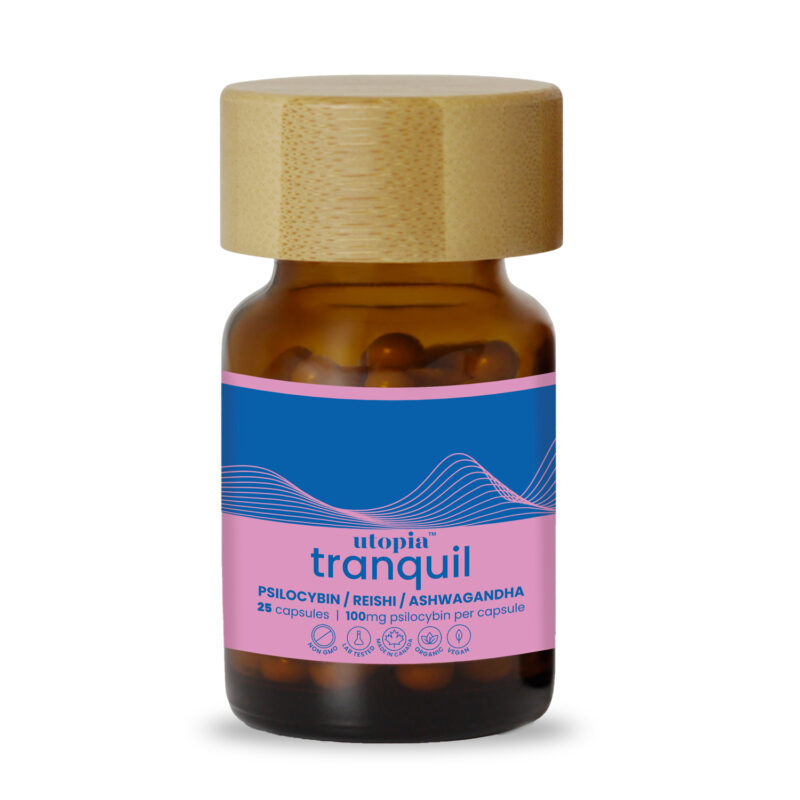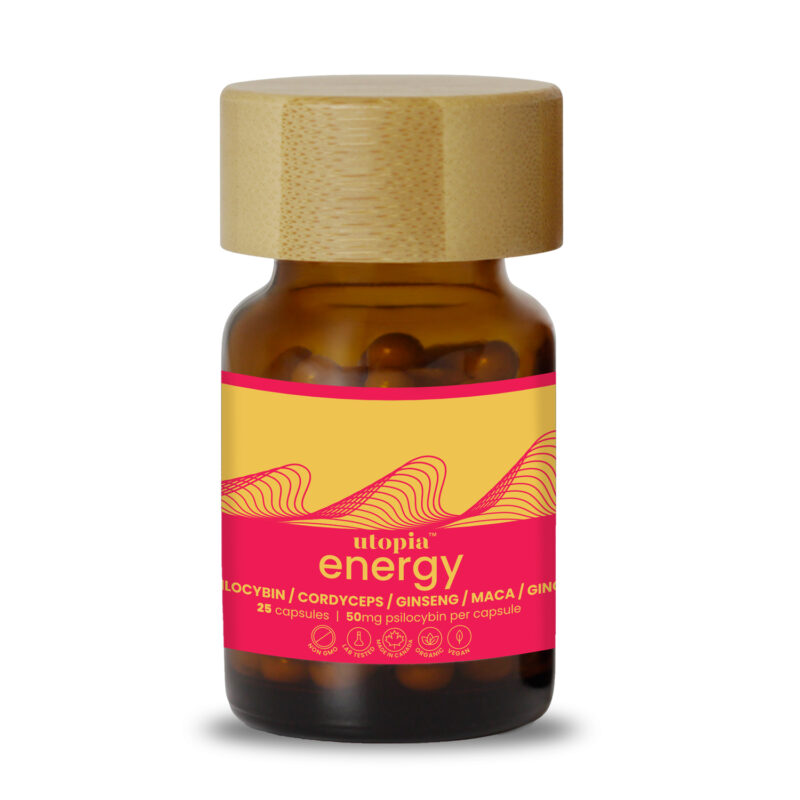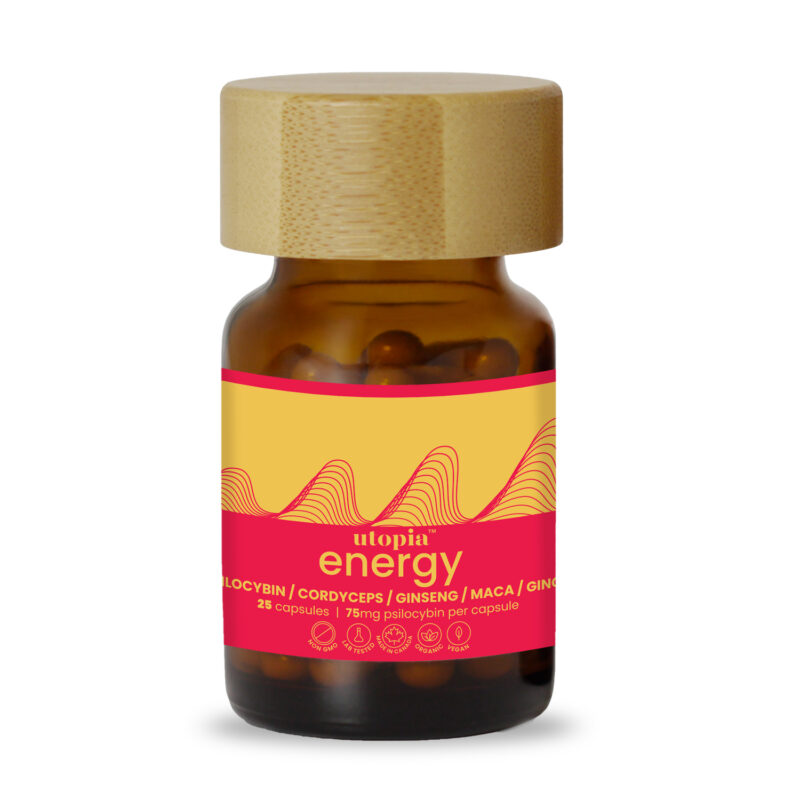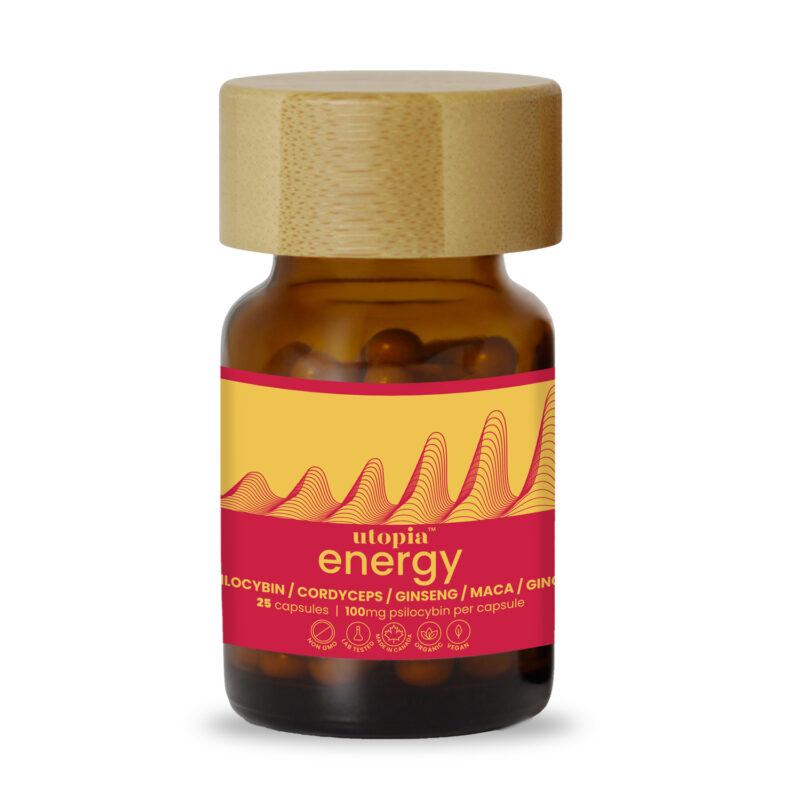What Are Adaptogens And How Do They Work?
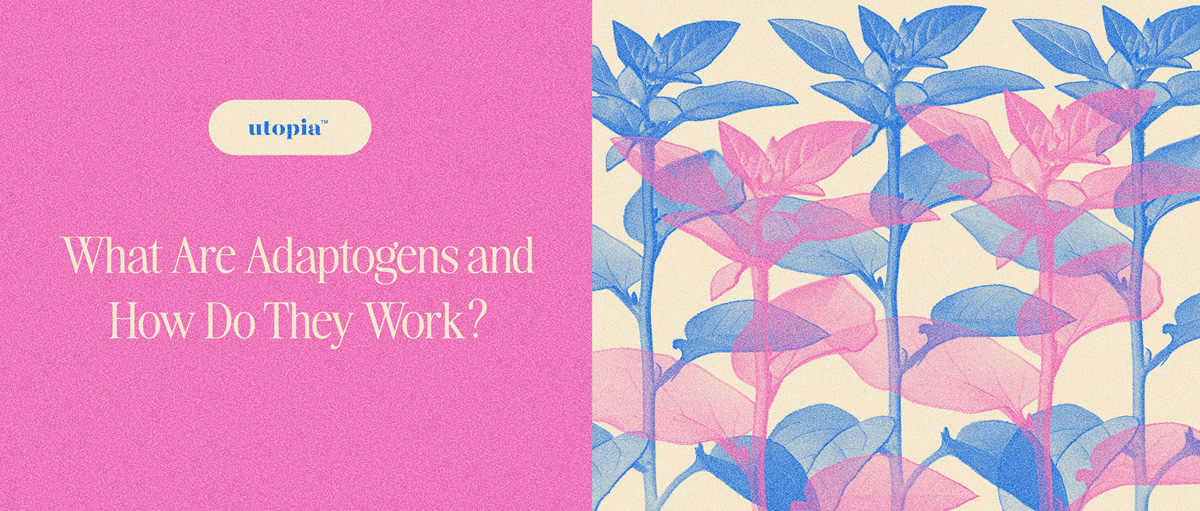
What are adaptogens, and why are they vital in managing stress? In today’s fast-paced, chaotic, and hyper-connected world, chronic stress is a near-universal experience. Stress contributes to fatigue, anxiety, hormonal imbalances, and weakened immunity. As more people turn to natural remedies for stress relief, adaptogens—a unique class of medicinal plants and functional mushrooms—are gaining recognition for their ability to support the body’s resilience.
These natural stress-relievers help the body adapt to physical and emotional stressors, balance cortisol, protect against oxidative damage, and optimize energy metabolism. Backed by both ancient wisdom and modern science, adaptogens like ashwagandha, reishi, maca, and rhodiola offer a holistic approach to stress management and mental wellness, without the harsh side effects of stimulants or pharmaceuticals.

The Ancient Roots and Modern Science of Adaptogens
Adaptogens are gaining traction in contemporary wellness circles, but their history spans millennia. Used extensively in Ayurvedic medicine and Traditional Chinese Medicine, these healing herbs and mushrooms were valued for their ability to restore inner balance, boost immunity, and support longevity. The word “adaptogen” was first coined in the mid-20th century, when Soviet scientists began exploring natural ways to improve the body’s resistance to stress.
These researchers identified adaptogens as substances that increase the body’s nonspecific resistance to stress—whether physical, psychological, or environmental—while supporting the body’s natural ability to achieve homeostasis, or internal balance.
Unlike conventional pharmaceuticals that target specific symptoms, adaptogens offer a broad-spectrum approach to stress relief. They support adrenal function, regulate cortisol levels, and strengthen both immune and neurological systems. Experts consider a herb to be a true adaptogen if it is non-toxic, works across multiple body systems, and helps normalize the body’s physiological functions. Today, a growing body of scientific research on adaptogens confirms what ancient healers long understood: these natural compounds don’t override your body, they support its innate intelligence, helping you adapt, recover, and thrive.

How Adaptogens Work: Supporting the Body’s Natural Balance
The biological mechanisms behind adaptogens’ stress-relieving effects are complex, elegant, and deeply rooted in the body’s internal communication systems. These compounds primarily interact with the hypothalamic-pituitary-adrenal (HPA) axis, part of the broader hypothalamic-pituitary-endocrine system: the communication hub between your brain and hormones. This system regulates mood, energy, metabolism, immune function, and even your sex drive.
Think of it as your body’s command center for balance. When it becomes dysregulated—through chronic stress, poor sleep, or environmental toxins—your health can spiral into fatigue, hormonal imbalance, and inflammation.
Adaptogens act as intelligent modulators of this system, helping the body maintain homeostasis, or internal equilibrium. Adaptogens don’t override your biology—they partner with it, helping restore your body’s natural rhythm when stress pulls it off balance.
When you encounter stress, whether physical, chemical, or emotional, adaptogens help modulate your body’s response through several pathways. Their action is both preventive and therapeutic, training the body to adapt more effectively over time.
Here’s How Adaptogens Work on a Physiological Level:
-
- HPA Axis Regulation
Adaptogens support healthy adrenal function and normalize cortisol production, reducing the long-term wear and tear of chronic stress. Elevated cortisol contributes to fatigue, poor sleep, anxiety, and inflammation—adaptogens help buffer these effects.
- HPA Axis Regulation
-
- Cellular Energy Efficiency
These compounds enhance mitochondrial function and ATP synthesis, providing cells with more usable energy during times of stress. This results in improved endurance, stamina, and resilience.
- Cellular Energy Efficiency
-
- Oxidative Stress Protection
Adaptogens act as powerful antioxidants, protecting cells from damage caused by free radicals. This reduces inflammation and supports long-term immune health.
- Oxidative Stress Protection
-
- Protein Synthesis & Recovery
Adaptogens stimulate the production of heat shock proteins (such as Hsp70 and Hsp16), which repair and protect cells from stress-induced damage—supporting quicker recovery and cellular resilience.
- Protein Synthesis & Recovery
-
- Biochemical Balance
These herbs influence important stress-related biomarkers including nitric oxide, cytokines, glucose, neuropeptides, and biogenic amines. This balance affects mood, cognition, immunity, and metabolic health.
- Biochemical Balance
Adaptogenic Modulation: Personalized, Intelligent Healing
One of the most unique traits of adaptogens is their bi-directional intelligence, a property known as adaptogenic modulation. Rather than simply stimulating or sedating, adaptogens respond to your body’s current state.
For instance, ashwagandha may be energizing for someone who is depleted, but calming for someone who is overstimulated. This personalized effect allows adaptogens to work with your body—not against it—restoring harmony where it’s needed most. This capacity for adaptive, targeted regulation is what makes adaptogens so effective at promoting homeostasis across multiple systems. They don’t force change; they support your body’s natural intelligence, helping it return to balance and thrive under stress.
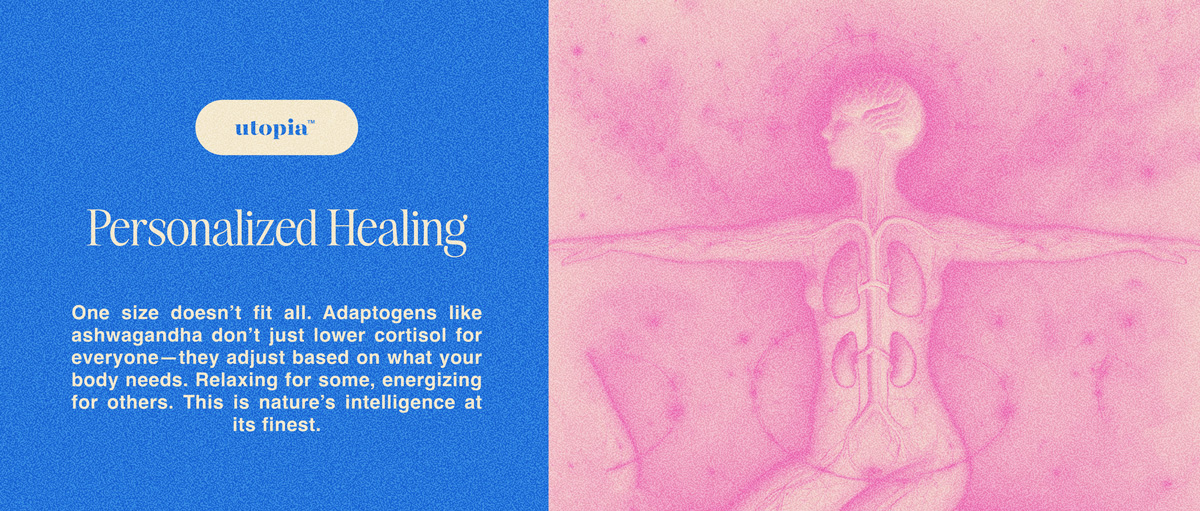
The Evidence-Based Benefits of Adaptogens
As interest in holistic health grows, clinical research on adaptogens continues to validate what traditional systems of medicine have practiced for centuries. These compounds aren’t folklore—they’re backed by modern science. Moreover, a growing body of evidence from peer-reviewed studies highlights the broad spectrum of health benefits adaptogens offer.
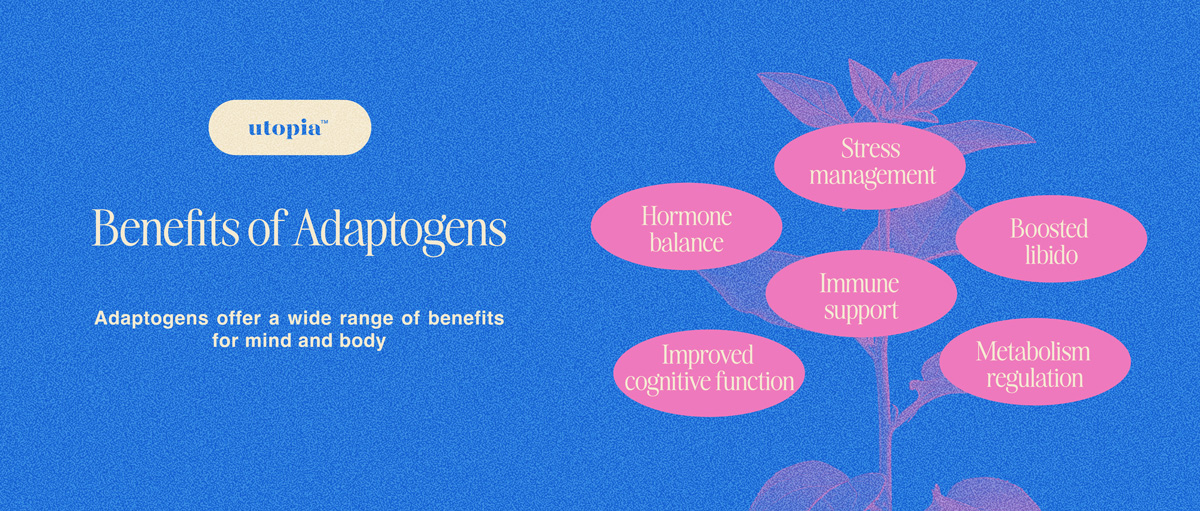
-
- Stress Management
Adaptogens are best known for their ability to regulate the body’s stress response. By supporting adrenal function and helping to balance cortisol levels, they enhance resilience to both physical and emotional stressors. Regular use is purported to promote a calmer, more focused state—even under pressure. In fact, clinical research found consistent evidence that adaptogens improve stress tolerance, protect against fatigue, and reduce the physiological impact of chronic stress.
- Stress Management
-
- Hormone Balance
By acting on the hypothalamic-pituitary-endocrine (HPA) axis, adaptogens help orchestrate a delicate dance between the brain and the body’s hormonal systems—supporting thyroid, adrenal, and reproductive function without overstimulating or suppressing. Rather than forcing the body in one direction, they help it respond with grace and balance, promoting stability in systems often thrown off rhythm by chronic stress.
- Hormone Balance
-
- Boosted Libido
Chronic stress is a known libido-killer, disrupting hormonal balance, circulation, and desire. Adaptogens like maca, found in our Energy microdose capsules, and ashwagandha found in our Tranquil microdose capsules, support sexual health and restore sexual vitality by supporting endocrine function, enhancing energy, and improving blood flow. When paired with psilocybin mushrooms, the effects can be even more profound. Psilocybin mushrooms and adaptogens work synergistically to reduce performance anxiety, increase sensitivity, and deepen intimacy. For a closer look at how this combination enhances connection, check out our article on psychedelics and sex.
- Boosted Libido
-
- Improved Cognitive Function
Adaptogens support brain health by protecting against oxidative stress, reducing neuroinflammation, and enhancing neurotransmitter efficiency. These effects help sharpen focus, improve memory, and increase mental stamina—especially during periods of stress or fatigue. By stabilizing the nervous system and promoting long-term neurological resilience, adaptogens offer powerful support for both immediate cognitive performance and lasting brain health.
- Improved Cognitive Function
-
- Immune Support
Several adaptogens, including reishi and rhodiola, are classified as immunomodulators—meaning they don’t simply boost immune function, but help regulate and balance it. This intelligent support can enhance the body’s natural defense against illness, reduce stress-related inflammation, promoting a more stable immune response over time. By helping the immune system stay responsive but not overactive, adaptogens contribute to long-term resilience, faster recovery, and overall vitality—especially in times of chronic stress or seasonal vulnerability.
- Immune Support
-
- Metabolism Regulation
Adaptogens can support metabolic health by improving energy efficiency, balancing blood sugar levels, and supporting healthy thyroid function. This may help stabilize weight, improve energy, and reduce metabolic stress.
- Metabolism Regulation
-
- Energy and Endurance Support
Clinical studies show that adaptogens enhance physical stamina and mental endurance, particularly in demanding conditions. By improving mitochondrial function and reducing stress-related fatigue, adaptogens like rhodiola and eleuthero help the body sustain performance over time without the crash associated with caffeine or stimulants.
- Energy and Endurance Support
Integrating Adaptogens Into Your Wellness Routine
Now that you understand how adaptogens work and the wide range of benefits they offer, the next step is choosing the right products and using them effectively.
From Soil to Supplement: Not All Adaptogens Are Created Equal
Not all adaptogens are created equal, and neither are all psilocybin mushrooms. The therapeutic potential of these natural ingredients depends entirely on how they’re grown, harvested, processed, and tested. That’s why at Utopia, we hold every step of our sourcing process to the highest standards.
Scientific research confirms what traditional healers have long understood: growing conditions directly influence bioactive compound concentrations—from immune-supporting triterpenes in reishi to stress-balancing withanolides in ashwagandha. We use only certified organic adaptogens, in our products, which have been cultivated in nutrient-rich soil without synthetic pesticides or chemical fertilizers. We work closely with trusted partners who specialize in clean, effective extraction methods—ensuring the adaptogens we source retain their full potency, purity, and therapeutic potential.
This same commitment to quality extends to our premium psilocybin mushrooms, which are carefully cultivated, dried, and tested for purity and precision. We formulate every product, from our Tranquil and Energy capsules to our Reishi Berry Shroom Tea, with an emphasis on synergy: adaptogens and psilocybin working together to support your entire stress response system.

What’s Inside Our Microdose Capsules
At the heart of many of our microdose capsules and tea formulations, you’ll find the following precision-sourced adaptogens, each chosen for their unique synergy with the body’s innate wisdom:
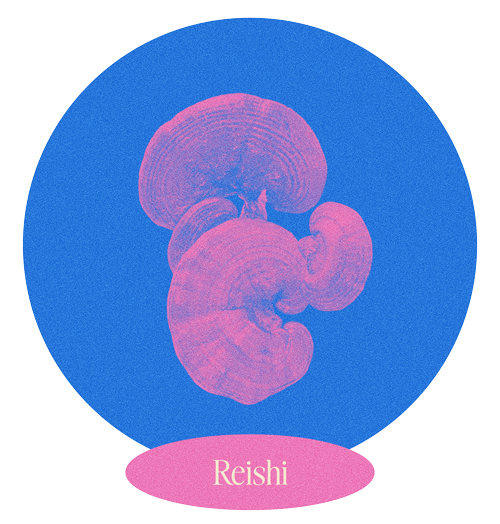
Reishi Mushroom
A revered functional mushroom, reishi is rich in triterpenes and polysaccharides that contribute to its well-documented immune-modulating, stress-adapting, and neuro-supportive properties. Often called the “mushroom of immortality,” reishi has been shown in clinical studies to help regulate immune response, calm the nervous system, and support the body’s natural ability to cope with physical and psychological stress. Its calming effects make it a foundational adaptogen for promoting long-term balance, emotional regulation, and overall vitality.

Ashwagandha
One of the most clinically studied adaptogens, ashwagandha has demonstrated significant cortisol-regulating effects in numerous trials, making it a cornerstone for stress resilience. It supports adrenal health, promotes relaxation without sedation, and helps stabilize mood and hormonal balance during both chronic and acute stress. Additionally, ashwagandha has shown potential benefits for improving sleep quality, cognitive performance, and even libido—further underscoring its reputation as a well-rounded and reliable ally in adaptogenic wellness.

Maca Root
This Andean powerhouse—often referred to as Peruvian ginseng—is valued for its ability to enhance stamina, support endocrine function, and promote sustained energy without the crash associated with conventional stimulants. Rich in vitamins, minerals, and unique glucosinolate compounds, maca is believed to influence the hypothalamic-pituitary axis, helping the body better adapt to stress. It has also been linked to improved libido, hormonal balance, and physical endurance, making it a versatile and energizing adaptogen in our daily support formulas.

Ginger
While best known for digestive support, ginger is rich in bioactive compounds linked to anti-inflammatory pathways and gastrointestinal ease. Included in all of our microdose formulations, ginger plays a functional role in reducing nausea and digestive discomfort—common issues that can arise when consuming psilocybin. This protective role helps smooth the journey, ensuring that physical ease supports the mental clarity and emotional resilience that microdosing is meant to unlock.

Adaptogens + Lifestyle = Real Results
Adaptogens work best as part of a comprehensive approach to wellness that includes proper sleep, balanced nutrition, movement, and stress reduction techniques. Some adaptogens are naturally energizing and best taken in the morning, while others promote relaxation and are more effective at night. Everyone’s biochemistry is different, so consider starting with a single adaptogen that targets your most pressing concern—whether that’s fatigue, mood, libido, or focus. Be consistent, track your experience, and allow at least a few weeks for noticeable results
Safety Considerations
While adaptogens are generally well-tolerated, it’s always wise to consult a healthcare provider before adding new supplements to your routine—especially if you’re taking prescription medications, are pregnant or nursing, or have hormone-sensitive or autoimmune conditions.
Discover Utopia’s Adaptogenic Blends
At Utopia, we’re proud to be at the forefront of functional plant and mushroom wellness. Whether you’re seeking calm, clarity, energy, or everyday balance, our adaptogen-powered formulas are designed to work with your needs!
Tranquil Capsules: Reishi, ashwagandha, ginger and psilocybin for stress relief and emotional balance
Energy Capsules: Maca, cordyceps, ginseng, ginger, and psilocybin for natural stamina and focus
Reishi Berry Shroom Tea: Sip your way to serenity or stimulation with our carefully crafted mushroom-infused blends
This article is provided for educational purposes. Please consult a trusted healthcare providers before beginning any supplement regimen, especially if you have existing health conditions or take medications.

ADAPTOGENIC PRODUCTS FROM UTOPIA MUSHROOM CO.
Tranquil (50mg) psilocybin microdose capsules
Tranquil (75mg) psilocybin microdose capsules
Tranquil (100mg) psilocybin microdose capsules
Energy (50mg) psilocybin microdose capsules
Energy (75mg) psilocybin microdose capsules
Energy (100mg) psilocybin microdose capsules
References:
-
- “A Preliminary Review of Studies on Adaptogens.” PubMed Central, 16 Nov. 2018, https://pmc.ncbi.nlm.nih.gov/articles/PMC6240259/.2.
- “Evolution of the Adaptogenic Concept from Traditional Use to Medical…” Wiley Online Library, 25 Oct. 2020, https://onlinelibrary.wiley.com/doi/abs/10.1002/med.21743.
- “Adaptogen Market Stronger with Clinical Research.” Nutritional Outlook, 15 Nov. 2020, https://www.nutritionaloutlook.com/view/adaptogen-market-stronger-clinical-research.
- “Research of Adaptogens in Stress and Ageing Disorders.” Phytomed, 16 Mar. 2025, http://phytomed.se/adaptogens/.
- “Efficacy and Safety of Ashwagandha (Withania somnifera) Root Extract in Improving Sexual Function in Women: A Pilot Study.” Journal of Evidence-Based Complementary & Alternative Medicine, vol. 20, no. 4, 2015, pp. 255–257. doi:10.1177/2156587215604253.
- “Rhodiola rosea in Subjects with Prolonged or Chronic Fatigue Symptoms: Results of an Open-Label Clinical Trial.” Complementary Medicine Research, vol. 24, no. 1, 2017, pp. 46–52. doi:10.1159/000457918.
- “An Investigation Into the Stress-Relieving and Pharmacological Actions of an Ashwagandha (Withania somnifera) Extract.” Medicine, vol. 98, no. 37, 2019, e17186. doi:10.1097/MD.0000000000017186.
- “Adaptogenic Properties of Six Rasayana Herbs Used in Ayurvedic Medicine.” Phytotherapy Research, vol. 13, no. 4, 1999, pp. 275–291. doi:10.1002/(SICI)1099-1573(199906)13:4<275::AID-PTR510>3.0.CO;2-S.
- “Effects of Adaptogens on the Central Nervous System and the Molecular Mechanisms Associated with Their Stress—Protective Activity.” Current Clinical Pharmacology, vol. 5, no. 3, 2010, pp. 198–219. https://pmc.ncbi.nlm.nih.gov/articles/PMC3991026/.
- “Hypothalamic–Pituitary–Adrenal Axis and Stress.” Neurobiology of Brain Disorders, edited by Thomas Efferth, Elsevier, 2021, pp. 55–66. https://www.sciencedirect.com/science/article/abs/pii/B9780444641236000047.





